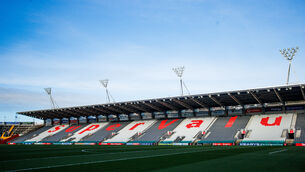Loughrea suffer as ‘blueprint’ gets torn apart
Loughrea needed one of Baldrick’s blueprints if they were to overcome the more skilful Ballyhale Shamrocks in Saturday’s club final. Loughrea needed to play a high-tempo game, to reduce the space and use disciplined, aggressive tackling, and to run at the Ballyhale defence from deep. They needed to plunder some scores through skilful creativity — or through frees by forcing the defence to foul.
This blueprint was in existence already to some extent — not in Badrick’s memoirs, but from Toomevara’s efforts in the semi-final game against Ballyhale.
Early on Loughrea did run at the Ballyhale defence and led by two points after ten minutes, but they needed all parts of the plan to be working efficiently to succeed; the high-tempo, in-your-face type of game never really got off the ground for them.
Ballyhale had the advantage in skill level and natural ability over Loughrea, and if this gap in standards wasn’t artificially reduced by tactics which were well co-ordinated tactics, then Loughrea were bound to suffer.
Ballyhale lined out as per the programme but Loughrea adjusted their line-up to try and limit the influence of the Ballyhale half-forward line by bringing midfielder Brian Mahony back to right-half-back to mark TJ Reid, and delegating Greg Kennedy to do a marking job on Henry Shefflin.
Kennedy tried hard and was somewhat successful in limiting Shefflin, but nonetheless Henry was influential, setting up scores and creating space for other forwards.
The Loughrea tactic of moving Brian Mahony back into defence failed on two counts, however. He was never really able to dominate TJ Reid, while his influence was also sorely missed at midfield. TJ got a lot of possession and hit three wides early on — not so much because of the pressure from his marker, but though adjusting his shooting in the tricky breeze.
Henry Shefflin, though failing to score himself, was bringing others into play and his passes provided scores for Mark Aylward and Patrick Reid.
As the half wore on Ballyhale’s class began to tell. During the first ten minutes Loughrea’s Kenneth Colleran at left-corner-forward and Johnny Loughlin at full-forward were moving well, and it looked as if they’d prosper if given enough of a supply, but that supply dried up somewhat. Loughrea then had to move Loughlin out to right-half-forward to try to win some ball, and in robbing Peter to pay Paul they lost some force on the edge of the square.
From a position of leading by four points to two they found themselves three points adrift as Ballyhale took a grip at midfield, where Michael Fennelly won his battle with Gavin Keary and controlled matters.
Ballyhale looked comfortable after 20 minutes, and when TJ Reid went through, Brian Mahony attempted to flick the ball away from him instead of hooking, and TJ got his shot away across Nigel Murray and into the corner of the net.
This was the defining moment of the half and though Loughrea battled back with three further points, the tide had definitely turned against them.
The decisive moment of the second half came just after the break, when a Shefflin 65 fell short. It was poorly defended and Patrick Reid fielded the ball and finished high into the net.
Ray Regan of Loughrea had had a good tussle with ‘Cha’ Fitzpatrick all through the first half but Cha began to impose himself on proceedings later in the game, picking up a lot of breaking ball around midfield and his half-back line. Ballyhale more or less jogged through the second half rather than sprinting, however, and though Loughrea battled on, it was a damage limitation exercise; at no stage did they look like making a game of it.
James Connolly, the Ballyhale keeper, did come to his side’s rescue with a save about ten minutes from time, but the fact that Loughrea had to wait until fifteen minutes into the second half for their first score says it all.
One of the other big talking points from the weekend was Dublin’s fine win over Galway yesterday. This Dublin team is a skilful, intelligent outfit and were well led by centre-back Ronan Fallon. Galway’s forwards opted for goals rather than points in the first half and question marks still remain over the central spine of their defence.
Dublin battled for the full seventy minutes in difficult conditions and will trouble any team which does not show them due respect.








